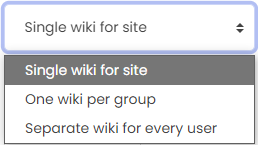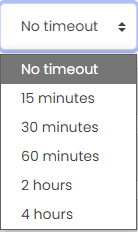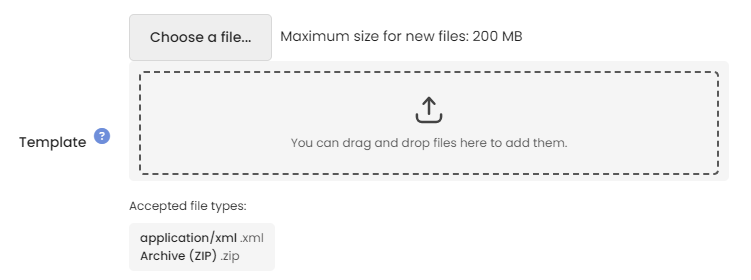Using the Moodle OU wiki for student co-creation
Wikis are online collaborative writing spaces that have multiple authors and contributors. The most well-known wiki is Wikipedia. This resource outlines the kinds of tasks possible, potential assessment opportunities, and initial set up for the Moodle Open University (OU) wiki activity.
Why?
The inclusion of collaborative activities in online learning can promote positive student performance outcomes. Collaborative group interactions facilitate active learning, shared knowledge, and promote social interaction and a supportive online learning community. Collaboration also models how to work with others in real-world situations. These collaborative activities help prepare students for the 21st-century workplace, including learning how to share ideas, express opinions, and manage time.
You can use wikis to develop a community of practice and establish a shared learning space within a face-to-face or blended course. Using wikis for assessment gives students a collective online space where they can share their knowledge and helps them develop graduate attributes and enduring skills in multi-modal literacy.
A wiki can be an authentic task in which students develop a tangible product that can be used after the assessment. Wikis also engage learners within a digital learning environment and “allow students to perform asynchronous online collaboration, with the added capacity to structure, re-structure and interlink content” (Bower & Richards, 2006, p.86) in a safe, shared space.
Wikis can also pose some issues and challenges for assessors in their efforts to keep track of each student’s contributions (Gehringer, 2008).
How?
Click on the heading below to expand/collapse the section about using OU wikis for assessments.
The Assessing with Wikis page provides some useful examples of assessment using a wiki, including the following:
"Students can work in small groups to research a specific topic, to prepare literature reviews and to discuss and prepare oral presentations as a group. In a wiki, this is easier than in a discussion board, where the multiple threads of posts and comments can become confusing. Students can edit and insert work into each other's contributions, and learn from and with each other. You can track students' unique contributions and assess them individually.”
(UNSW n.d.)
As a collaborative research writing assessment
- Students develop an annotated bibliography to begin research on a topic.
- In the course of posting and reading others' posts, students identify others with similar research interests.
- At a certain point, they are encouraged to form wiki groups according to these similarities.
- They share resources and research on their area of interest.
- Within their groups, students collaborate on a major wiki entry on a common chosen topic.
- Individual student contributions are posted as sub-topical entries. These are then interconnected among themselves as well as to the major topic entry, which is drafted collaboratively.
In group oral/video/project presentation for tutorial assessment
Tutors can set up group wikis (with accompanying assessment criteria) where students discuss the assessment task, nominate topics of interest to them, find like-minded collaborators, develop student teams and project ideas, and coordinate their emerging group projects. Often the workload and cooperative experiences of research are distributed unevenly throughout a project group, but this unevenness will be clearly visible to the tutor on inspection of the discussion wiki, even if the actual presentation appears to be a seamless whole. Students can also be invited to peer assess individuals' contributions.
Weekly assessment activities for individuals and groups
You might want to include, as an assessment component, weekly wiki entries by individual students to summarise lecture, reading or topic material or to solve related problems; or you could call for students to collaborate on posting weekly wiki contributions to share dialogue in a community of practice and assess these collaborative pieces.
Creating a new OU wiki in Moodle
- Ensure Edit mode is on.
- Click the Add an activity or resource button.

- Select OU wiki from the Add an activity or resource chooser.

Note: The abbreviation OU refers to Open University, the developers of this activity type for Moodle. - Enter a meaningful title in the Name text box.
- (Optional) Add a description to the activity in the Description text box.
- In the Wiki settings section, click Sub-wikis and select which type of wiki you would like to use from the dropdown menu. There are three options to choose from:

- Single wiki for site – This wiki behaves as one single wiki. Everybody on the site sees the same pages.
- One wiki per group – Members of each group see an entirely separate copy of the wiki (sub-wiki) specific to their group. You can only see pages created by people in the same group. If you are in more than one group, or you have permissions that allow you to view all groups, you get a dropdown to choose a group.
- Separate wiki for every user – Every single user gets an entirely different wiki. You can only see your own wiki unless you have permissions that allow you to view others, when you get a dropdown to choose a user. (This can be used as a way for students to contribute work, although you should consider other ways to achieve this such as the Assessment activity.)
Note: The group option works with the chosen grouping. It will ignore groups in other groupings.
- Complete additional settings to suit your requirements. For further guidance on settings, refer to the Additional settings section below.
- Click the Save and display button.
Your OU wiki activity has now been created.
Click on the heading below to expand/collapse the section.
Annotation system
With annotation enabled, you can add inline annotations to wiki pages. An example use-case for this would be adding comments to a students’ work.
Select Yes in the Annotation system dropdown menu if you would like to add inline annotations to wiki pages. 
Time allowed for edit
If you select a timeout, people editing the wiki are only allowed to edit it for a given time. The wiki locks pages while they are being edited (so that two people can't edit the same page at once). Setting a timeout prevents the wiki from becoming locked for others.
If enabled, users will see a countdown timer while editing a page. If the timer reaches zero, their edits will automatically save, and they will be removed from the editor.
Select the desired timeout duration from the Time allowed for edit dropdown if you would like to have an automatic editing countdown timer.
Allow editing from
If you enable this option, the wiki enters read-only mode until the given date. In read-only mode, users can see pages, navigate between them, view history, and participate in discussions, but they cannot edit pages. To set date restrictions on editing:
- Click the Enable button for Allow editing from to select the date from which students can edit the wiki.
- Click the Enable button for Prevent editing from to select the date from which students can no longer edit the wiki.

Wiki templates
A template is a predefined set of wiki pages. When a template is set, the wiki starts off with the content defined in the template. The template applies to each sub-wiki; in “One wiki per group” mode, for example, each group’s wiki is initialised with the pages in the template.
To create a template, write the pages you want on any wiki, then visit the Index page and click the “Save wiki as template” button. (You can also manually create templates in other software; it is an extremely simple XML format. Look at a saved template to see the format.) You can add the template after the wiki has been created. Adding a template only affects newly created sub-wikis, existing ones will remain as at present.
Show word counts
To enable the wiki to show a word count for each entry, click the Show word counts dropdown menu and select yes (on) or no (off).
Importing pages
To allow you to import pages from other wikis in your subject site, click the Link to import pages checkbox. ![]()
For guidance on designing and using an OU wiki activity for assessment, refer to the section below.
Related information
- Assessing with Wikis (UNSW) | External resource
- Wiki Video (Moodle.org) | External resource
- Blog, Wiki or Forum - which should you use? (UNSW) | External resource
References
Bower, M. and Richards, D. (2006). Collaborative learning: Some possibilities and limitations for students and teachers. In Who’s learning? Whose Technology? Proceedings of the 23rd annual ASCILITE conference, Sydney, 79–89.
Gehringer, E.F. (2008). Assessing Students’ Wiki Contributions. Proceedings of the 2008 American Society for Engineering Education Annual Conference and Exposition.



